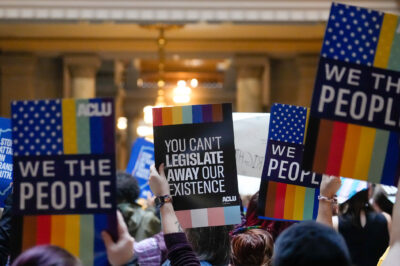For Jay A. Miller, the ACLU was his life — not just a career. Working for fairness and justice was woven into Jay’s DNA — he lived, breathed and embodied civil liberties. A one-time union organizer who organized his first strike at his father’s soda pop company, Jay became a powerful voice for the American Civil Liberties Union. He died at age 83 on January 3.
Anyone who met Jay more than once, or worked with him, likely heard him describe one of his greatest accomplishments: he was on President Nixon’s infamous “enemies” list for having permitted some of the Chicago 7 defendants to use the ACLU offices to prepare their defense. He also was deservedly proud of bringing Dr. Martin Luther King Jr. — and the civil rights movement — north. He led the ACLU’s efforts to defeat S-1, Nixon’s repressive attempt to rewrite federal criminal law. (Some of the worst provisions in the so-called Patriot Act passed after 9/11 were first proposed in S-1.)
In an ACLU career that spanned more than four decades, Jay was executive director of ACLU affiliates in Northern California and Illinois — where he served for more than 25 years. He also served as associate director for the ACLU National Legislative Office in Washington, and led a national emergency development campaign for the ACLU headquarters in New York.
In Illinois, Jay traveled to every corner of the state to speak out for basic rights — whether popular or unpopular. Jay loved to debate — he relished the fierce back-and-forth with an opponent who disagreed with the ACLU’s position. He was a favorite with local media because of his accessibility, his passion, his knowledge and his bombastic quotes.
Jay Miller was born on February 8, 1928, in Cleveland. After serving in the Army just after World War II, he graduated from the University of Illinois, Urbana-Champaign, with a degree in social science. After a brief career as a reporter and feature writer with the Cleveland Press, Jay joined the Amalgamated Clothing Workers of America as a business agent and education director. He moved to Chicago in 1961, when he joined the the American Friends Service Committee, where he led campaigns for a nuclear test ban treaty and helped organize a rally for the Dr. King at Soldier Field.
In 1965, Jay became the executive director of the ACLU of Illinois, taking over an office with a staff of four and a budget of less than $50,000. In his early years there, the organization took on a number of new and innovative cases — including desegregation of the Waukegan public schools, challenges to racial segregation in public housing, and defending protestors at the 1968 Democratic National Convention in Chicago.
He also took a prominent role in challenging the police accounts of the shooting of Black Panther leader Fred Hampton in Chicago. With others, he led the calls for an independent investigation into the raid that resulted in Hampton’s death — leading to the true account of the events of that day becoming publicly known.
Jay left Chicago in 1971 to lead the ACLU of Northern California in San Francisco. By the end of the decade, the national ACLU called on Jay to assist the organization in recovering from protests and membership loss after the ACLU of Illinois defended the right of neo-Nazis to hold a demonstration in Skokie, a community then home to many Holocaust survivors. Jay authored a fundraising letter signed by the Illinois lawyer in that case, David Goldberger, which raised a significant amount of money and was widely credited with saving the ACLU from bankruptcy.
Returning to the ACLU of Illinois in late 1978, Jay led many of the first cases in the state to protect rights for persons with HIV and AIDS, as well as protecting basic rights for lesbians and gay men. The organization launched a lawsuit designed to reform the Illinois Department of Children and Family Services — an action that continues today — and another suit to force reforms at the state Department of Mental Health.
Additionally, Jay helped lead the organization’s challenges to restrictions on reproductive rights in Illinois, resulting in the state today having far fewer limits than any other Midwestern state. He also helped establish the Racial Justice Project at the ACLU, which has challenged racial profiling and other racial discrimination across the state.
He is survived by his wife, Lou Kaplan, and his children: Josh, Adam and Rebecca.
Learn more about civil liberties: Sign up for breaking news alerts, follow us on Twitter, and like us on Facebook.



